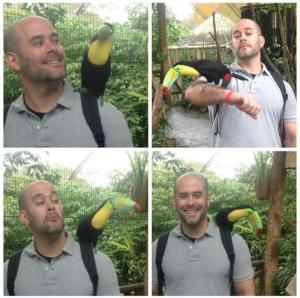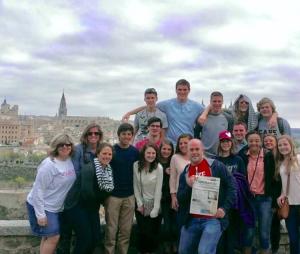Travel, teaching mean the world to Greg Berman
When summer hits, chances are Greg Berman won't be stateside.
The 37-year-old caught the travel bug at a young age, he said, thanks to his parents opening their home to foreign students studying in the United States. He's not totally sure where he'll end up this summer, but Japan is definitely in the running, he said.
"I usually just pack a bag and go," the laid-back Cape Henlopen High School Spanish teacher said.
Berman didn't always plan to spend his days molding future generations and traveling the world on his breaks. He went to the University of Delaware to study finance, minoring in international business and Japanese, with the hopes of making big bucks.
"I guess I kind of saw dollar signs," he said. But when he graduated in 2002, he said, the market wasn't strong, so he had a tough time finding work. He turned to the idea of teaching abroad, and applied for a job as a Japanese exchange teacher.
At first he got turned down. But officials were having a hard time filling a spot in Awaji, a rural island rejected by other applicants, so he got a follow-up call.
Berman didn't care how small the island was. He just wanted to go.
"It's so small, it's not even on the map," Berman said, pointing to where Awaji should be on a globe he keeps on his desk. As he was the only foreigner on the island, the youngsters he taught were amazed by the size of his nose and the hair on his arms.
Shortly after he arrived, he said, a few children ran up to him and rubbed a hairy arm exposed by his short-sleeved shirt. He shared the strange encounter with a mentor, who said the next time it happens, he should tell the children – in Japanese, of course – "I'm not a dog," he laughed.
Berman spent about three years teaching in Japan, where he also taught Spanish on the side for fun – a skill he picked up in Ecuador where he was a high school exchange student.
As he prepared to head back home from Japan to co-found a food delivery business, he said he realized his love for finance was dwindling.
"It was gradual," he said of the shift in his career plans. "I thought I'd come back and have a business, maybe build it up, sell it and build another business. And then I realized how much I really missed working with students."
He gave food delivery a try, but he said he needed another source of income during the slow times. That led him to substitute teaching, where it was suggested he go back to school and get a master's degree.
That's exactly what he did.
Now Berman has been an educator for 13 years, including his time in Japan. He's taught Spanish at Cape High for the last seven years and now lives in his parents' vacation home in Rehoboth Beach during the school year.
"I used to think I'd make a ton of money in finance," he said. "Now I don't make that much money as a teacher, but I'm OK with that. My life is amazing, and I love what I do."
Berman said he was lucky as a child, too, because his parents made sure he never wanted for anything.
"I have amazing parents," he said. "They raised my brother and me in a really loving environment, hugging us every day and telling each other, 'I love you' before bed. They gave us everything we needed."
And as adventurous as he is – he has visited more than a dozen countries in South America, Europe and Asia – he stills calls his parents to check in.
"Every day at three o'clock, they're my first phone call," he said. "They're great."
Taking that nurturing spirit into the classroom, Berman said some of his proudest teaching moments had nothing to do with textbooks.
A couple years ago, he got glasses for a freshman who still wears them, even though they're now held together with tape.
"When I see him, it makes me happy because he's not squinting," Berman said. "Moments like that make me feel like a rockstar."
If students don't master speaking Spanish in Berman's class, he said they will learn two things that were emphasized while he was growing up: "Manners will get you everywhere," he said, and "organization is the key to success."
Berman said he also enjoys the challenge of students who have no interest being in his class. He hopes school trips abroad – to Costa Rica or Spain – help foster a love for foreign language among even the most difficult students.
"When we get off the plane, and the students hear people speaking Spanish, see the signs in Spanish, have to convert money and use Spanish, their eyes light up," he said, pointing to the goosebumps on his hairy arm. "And when the students recognize they used the Spanish they learned in class, that to me is worth more than any amount of money in the world."
























































